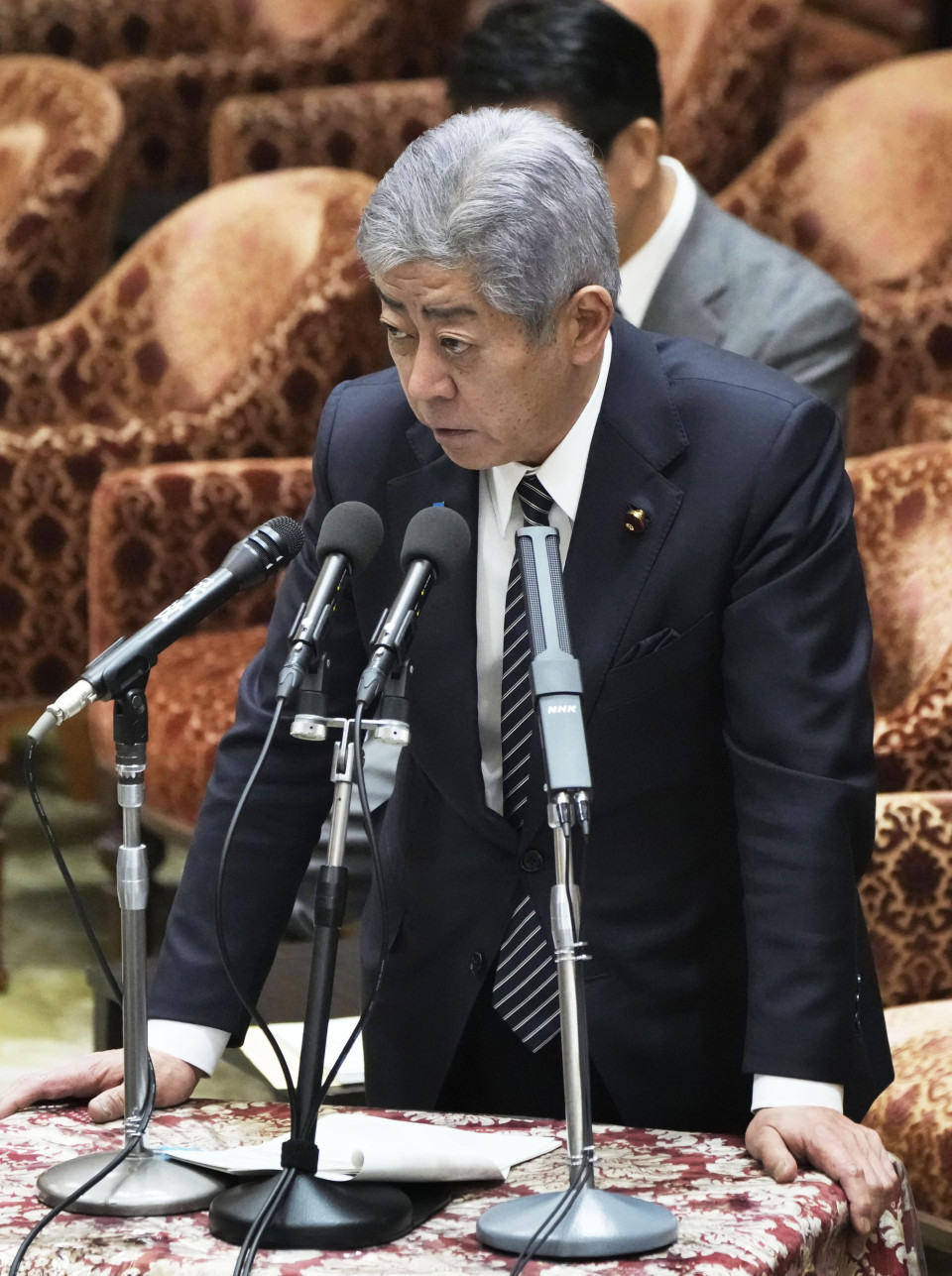Support groups and lawmakers in Japan concerned about domestic violence are sounding the alarm about a legislative change to allow joint custody in divorce cases after an Irish man was arrested on suspicion of killing his Japanese ex-wife in Hungary.
The 43-year-old woman reportedly had contacted the Japanese Embassy in Budapest about her situation and requested that it issue passports to her two children as she hoped to leave the country and return to Japan.
However, she did not officially apply for the documents after being told by the embassy that her former husband’s consent was required under the Central European country’s joint custody rules.
But there are concerns that a similar situation could arise in Japan, where a bill was passed last year to introduce joint custody for divorced couples with children, a landmark decision that paves the way for the adoption of the practice widely used by other nations.

File photo shows Foreign Minister Takeshi Iwaya explaining the response of the Japanese Embassy in Hungary at a budget committee session of the House of Representatives in Tokyo in February 2025, after a Japanese woman was allegedly murdered by her Irish ex-husband. (Kyodo)
“The embassy made an error in judging the level of urgency by the woman,” Yosuke Suzuki, a Diet member of the Constitutional Democratic Party of Japan, said at a parliamentary budget session of the House of Representatives on Feb. 28.
Suzuki introduced testimony from a friend of the dead woman, explaining that “she had been choked by her ex-husband” and repeatedly told authorities about his violent tendencies. The lawmaker criticized the Japanese Embassy in Hungary for its response, despite it having no policing power in the nation.
Keiichi Iwamoto, the director-general at the Consular Affairs Bureau at the Foreign Ministry, suggested the embassy “acted appropriately,” saying, there were no “specific consultations about domestic violence.”
According to information provided by Foreign Minister Takeshi Iwaya and the woman’s friend, in June 2022, the embassy urged the woman, who had sought advice about her relationship with her husband, to contact the police if she was experiencing domestic violence.
After divorcing in 2023, she had planned to return to Japan with her two children but was unable to do so as her ex-husband had taken their passports.
She requested the embassy issue a document to allow her to return with her children but was shaken when told that she should discuss the matter with her ex-husband as she needed his permission to return to Japan with them.
“She was too afraid to even discuss the matter with him,” her friend recalled.
The woman had contacted the Hungarian police in August and November of last year due to death threats she said she received from her ex-husband, including a letter in 2023 that reportedly said she would “die in agony,” but they failed to take action. Her body was found in her burned Budapest apartment on Jan. 29.
Investigators initially thought the fire was the result of an accident, but on Feb. 3, they arrested the ex-husband after suspicions surfaced of his involvement in her death. He has denied the allegations.
Hungarian police apologized for an inadequate response to the woman’s complaints and decided to take disciplinary action against five police officers for failing to properly investigate the case. Two of the officers were reassigned and removed from their positions.
According to a Foreign Ministry official, the Hague Convention — an international treaty to which Japan is a party — does not include provisions specifically addressing passport issuance to a parent in jurisdictions that recognize dual custody.
However, when consulted about the possibility of fleeing a country with children, the official said, “We carefully explain to (parents) that there is a risk of being accused of abduction or having a court case brought against them.”
In recent years, cases of alleged cross-border child abductions, often by the Japanese mother after a marriage breaks down with a foreign father overseas, have been widely reported and become a diplomatic issue with Japan being called on to revise its laws.
Often the mothers return to Japan to seek shelter at their parents’ or relatives’ homes while the fathers desperately seek the return of their child, often in vain.

File photo shows Hungarian police spokesmen addressing the press in Budapest in February 2025. (Photo courtesy of the police)(Kyodo)
Sole custody also causes distress in Japan, with one parent in a divorced couple often losing access to their children despite their wish to continue involvement in their lives.
The revised law for joint custody is expected to enter into force in 2026 and be applied retroactively to those who have already divorced.
Under the revised Civil Code, parents will generally determine between themselves whether to opt for sole or joint custody, but if there is a dispute, a family court will intervene and decide on custody arrangements.
In cases where domestic violence or abuse by one parent is proven, the other will be awarded sole custody.
Proponents of the joint custody system say the revision allows both divorced parents to take part in child-rearing.
But victims of domestic violence have voiced concern that the new system could enable their abusers to reengage with their family and have contact with their former spouses if abuse by one of the parents was not clearly proven.
Some also fear such victims may not be able to negotiate single custody or joint custody on an equal footing.
A support network set up by lawyers in Japan who oppose joint custody argues that the revised law may limit the options and actions of domestic violence victims.
In response to the incident in Hungary, the support network urged the Foreign Ministry to assign officials familiar with domestic violence to diplomatic missions abroad.
Makiko Ishii, a lawyer with expertise in overseas divorce cases, criticized the embassy’s reluctance to issue the passports, saying, “I think they were cautious because of the possibility of violating local laws, but they lacked a sense of urgency. They should have been more flexible.”
She stressed that although there is a provision in Japan’s revised Civil Code that allows for the sole exercise of parental authority if there are “urgent circumstances,” “there is a risk that a life-threatening situation may be judged as ‘not urgent.'”
Under joint custody, acts that fall under “urgent circumstances” or “everyday acts” can be decided by only one parent. However, it has been pointed out that the definition of the terms is unclear, so the government is working to clarify details.
Related coverage:
Japan sees no fault in embassy’s response over Hungary murder case
Japanese woman found dead in Hungary had sought embassy help over DV
